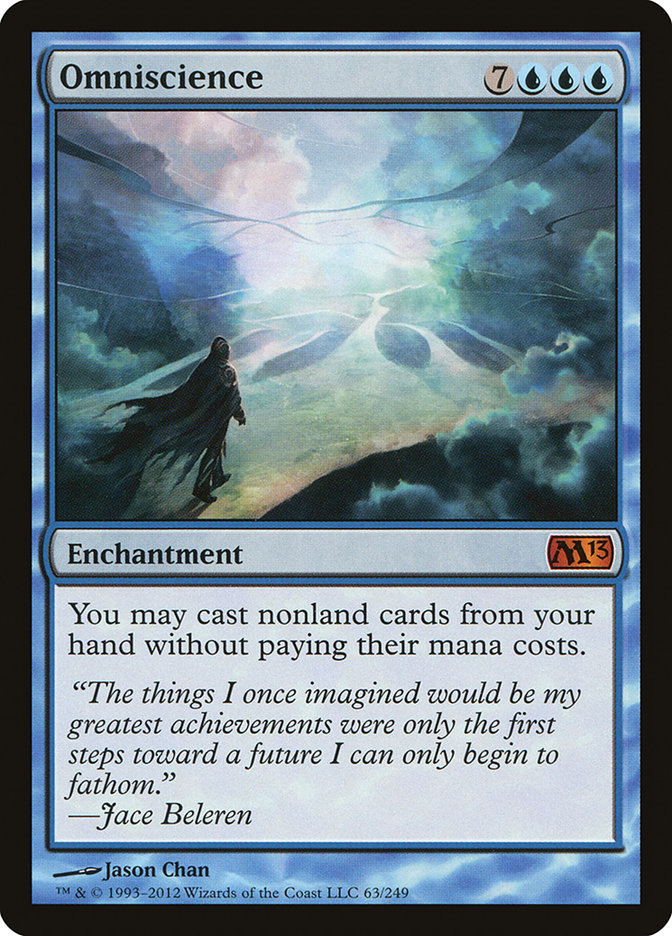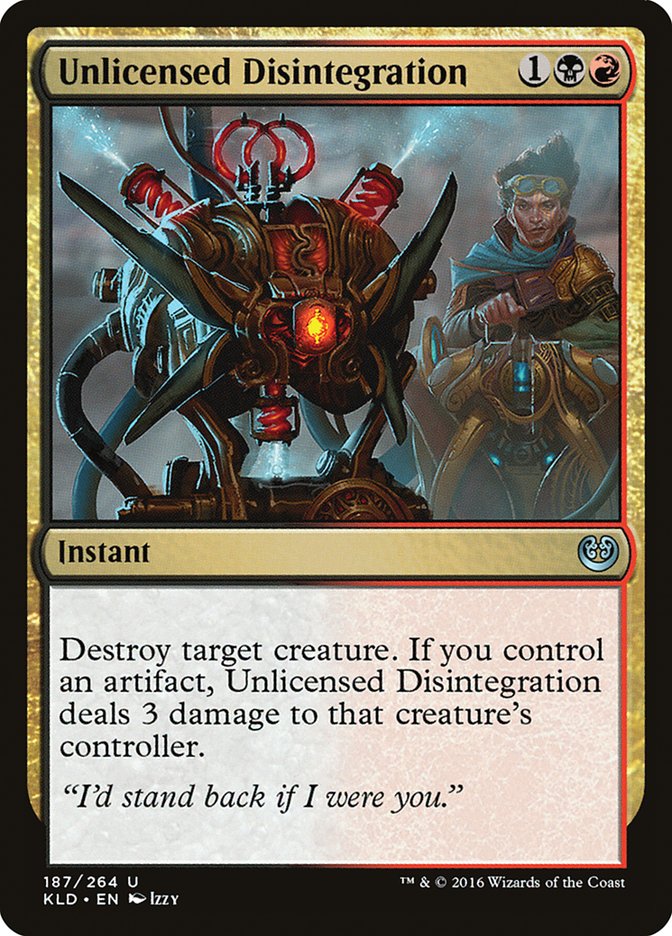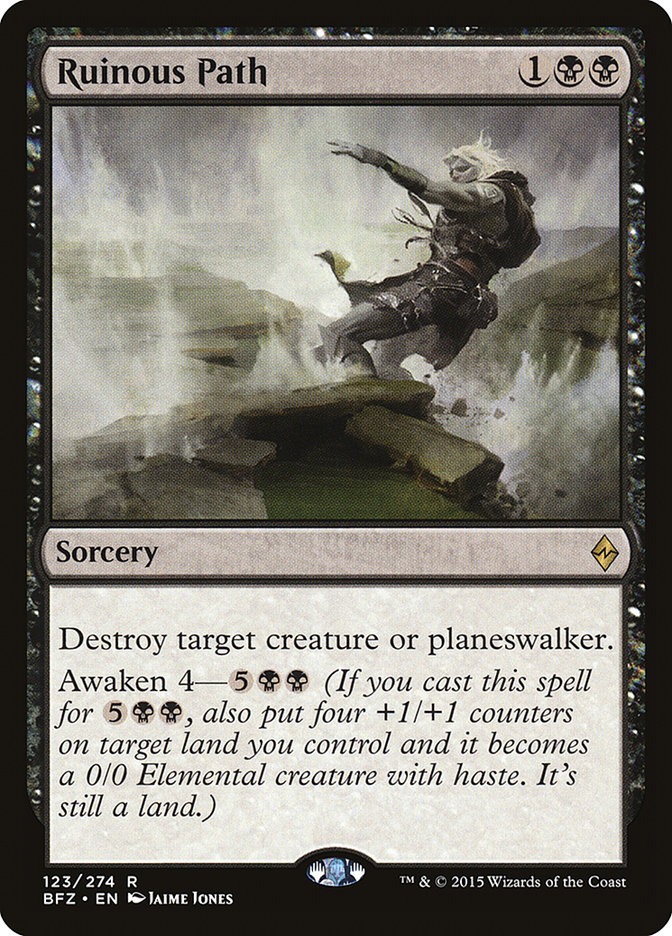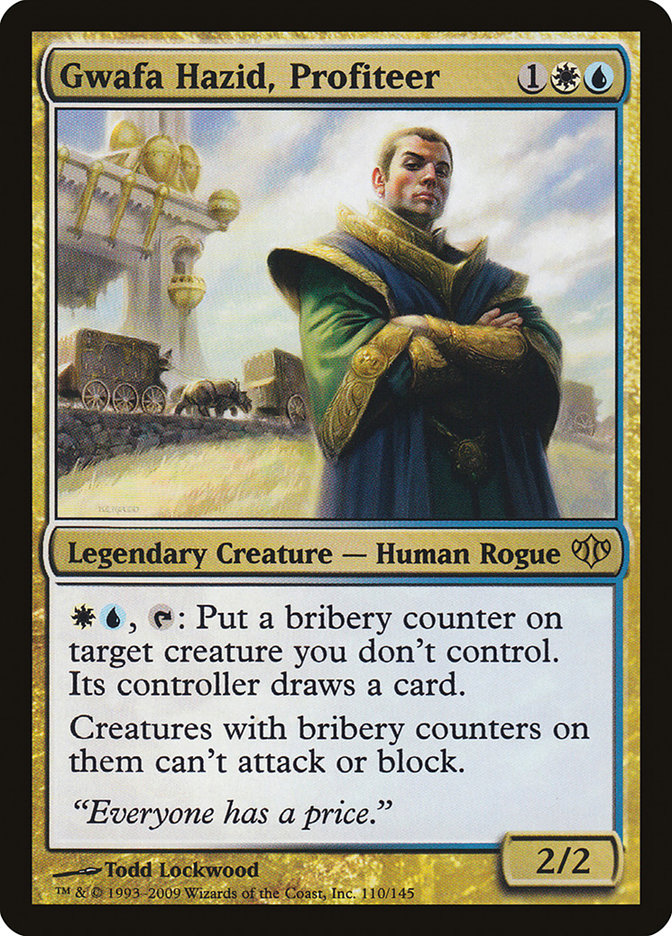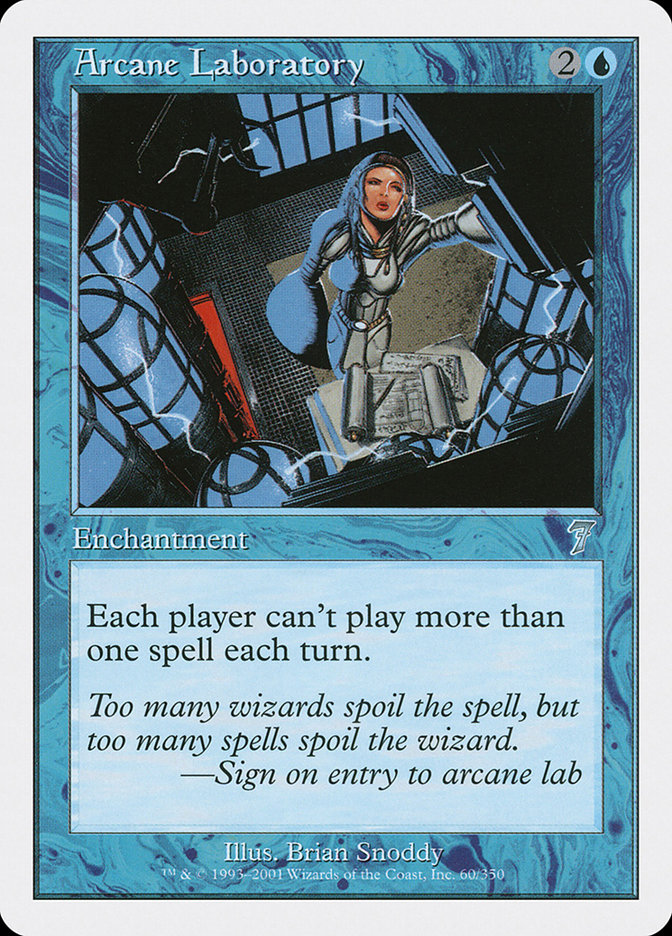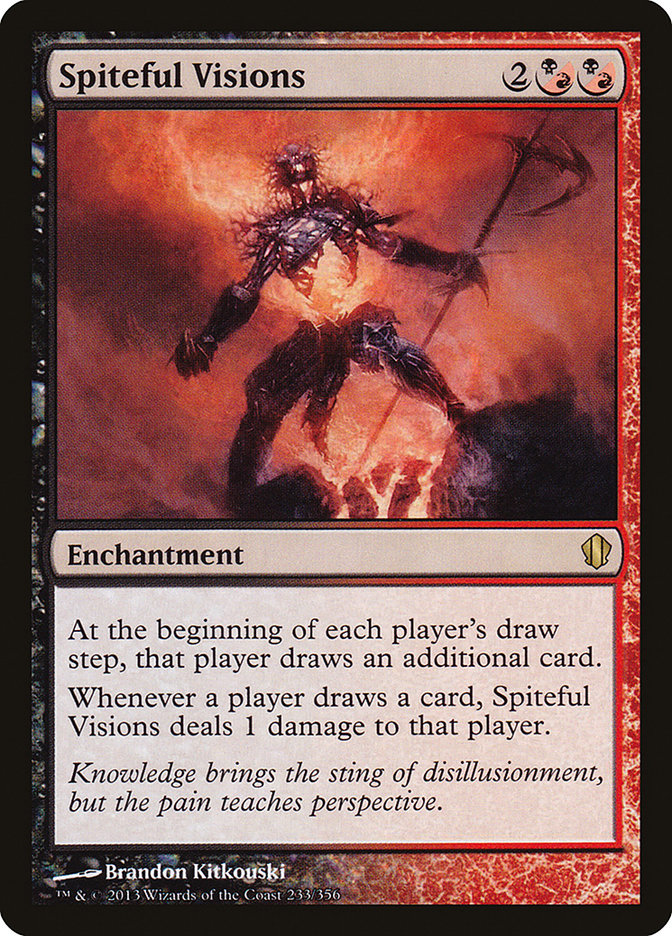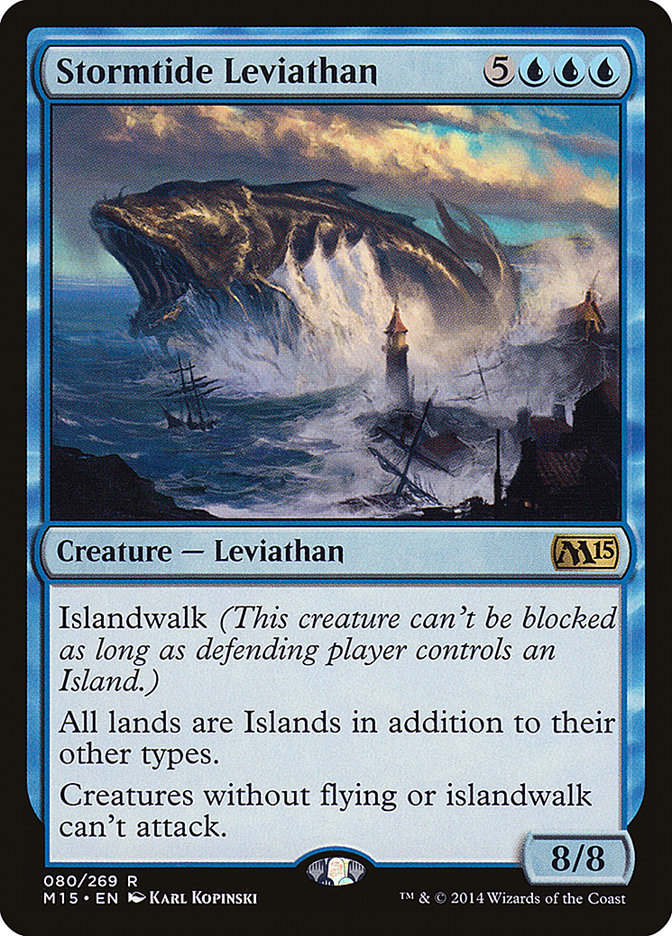I was talking with some of the guys from General Damage Control when Mr. P shared a story about being stuck under an Arcane Laboratory and Aura of Silence. I asked about answers he had in his deck. During the conversations he said the following:
“To what extent should you try to build a deck that does everything? Specifically, is it reasonable to expect that other people run answers, and [stuff] like Arcane Lab that equally hurts all players will be blown up by someone (not necessarily you)?
Should you go into every game of Commander with a certain expectation of the other players, or should you always try to do everything?”
Doing everything is pretty bad. The colors in Magic have different strengths and weaknesses, plus the various archetypes create another dynamic. Doing everything is practically impossible. To be able to do everything means the deck is most likely inconsistent. To do well in Commander, you have to compromise somewhere on the things your deck can do.
The commander helps direct your deck. But that alone doesn’t do enough. You need to balance different parts of the deck. You need to find the right mix of questions and answers.
Questions and Answers
Answers, for Magic, are the things that keep you alive. Most often this is spot removal. Counterspells, sweepers, and artifact or enchantment hate are also answers. With multiple opponents, you typically need some answers to things in Commander. The challenge is similar to one tournament players face: which answers do I run?
Standard tends to limit this scope because certain potential answers are unplayable in a Constructed format, such as Tidy Conclusion, which is good in Limited but never played in Standard. But even in Standard there are options like Murder, Unlicensed Disintegration, and Ruinous Path. Deck constraints and expectations of the metagame shift which removal spells are at a premium. Commander has a similar challenge; if you are the only player running black, then Murder is a subpar choice when Doom Blade is an option. If planeswalkers are prevalent, then Hero’s Downfall is more attractive. Then Ruinous Path is an option too, despite the sorcery speed.
The good news for Commander players is that creature removal is fairly straightforward. You almost always want the widest possible target for the cheapest mana cost. But for other removal you need to make some decisions. Naturalize is a clean and simple effect. If you want to be more mana-efficient, you can use Natural State, but this effect restricts what you can target. As answers become more mana-efficient, they become more specific. Compare Revolutionary Rebuff and Abrupt Decay to Anguished Unmaking and Void Shatter. The more mana, life, or other resources you spend, the broader your answers are. When building, you may need to dip into older sets to find spells that offer a wider range of answers before current Magic design sensibilities took place.
Questions are the things that win a game. Most often these are creatures and other permanents, but a huge Comet Storm is certainly a question demanding an answer. Door to Nothingness is a question card. Blightsteel Colossus, Thragtusk, sometimes even a humble Soul of Theros can be a huge question to the table. You always need questions in your deck. Always.
If you deck has no questions, you have no ability to win the game. Some people enjoy playing a game that takes six hours and nothing happens during it. My friend John does this with his Gwafa Hazid, Profiteer deck. If he gets up and running, then nothing will happen all game. For a purely social time, it is fine, but for gameplay it is frustrating beyond belief. Have something to close out a game.
How Many Answers?
Determining how many answers to run is dependent upon your deck’s role, what you want to happen in a game, and your playgroup. The role shapes your deck’s goals and your gameplan. The things you want to happen in a given game matter; if you want a ton of huge things to occur, then you might need fewer answers. This also matters by group. Each group has different definitions for what games are fun for them; you should seek to match that.
However, be aware of what is happening with each person in the group. The player who decides to jam a deck of haymakers and huge swingy recovery spells is fine. I have a few decks that are more intent on going off with their gameplan than doing anything to interfere with my opponents. But if every single deck of mine was essentially playing solitaire against my opponents, is that fair to the group? If you make a decision to ignore anything everyone else is doing, then you are forcing the remaining players to pick up that slack. Once in a while, this is fun and a good shift in gameplay. But doing it every game means you are being selfish and forcing them to change their decks away from their desire just so the game can run well.
Deck role is a huge shift on the number and type of answers your deck can run. Aggressive decks have fewer answers to make room for all the cards. In contrast, the control decks have far more answers, but the ability to close out a game is diminished. Tournament games have a clock which impacts this; we don’t. Use that unlimited time, but make sure you aren’t wasting that of your friends.
The biggest determination in how many answers you run is what you want to happen in a game. Do you want to answer the biggest problems for your deck? Do you want to answer everything? I prefer to run answers to the things I expect to see and a few general answers to catch anything. If I see a huge trend at the game store, I make some shifts in my decks. The Kalitas, Traitor of Ghet deck I run has answers to lots of creatures and a couple of catch-all cards. Running Scour from Existence is never a great feeling, but having even one out to a card like Iona, Shield of Emeria or Ulamog, the Ceaseless Hunger can make all the difference.
How Will My Opponents React?
Mr. P brought up another point besides just running answers. How much should you expect your opponents to help out with a card like Arcane Laboratory or Spiteful Visions? The broad-strokes approach, for me, is about a 50-50 split on a problem card being answered. Other players will need to adjust accordingly for their groups. Even with a 50-50 call, that matters less than having an answer in and the desire to use it. Arcane Laboratory may annoy the whole table, but it really hurts the Jori En, Ruin Diver player. Spiteful Visions is rough, but if it keeps someone from drawing a boatload of cards, it might be worth keeping around.
The real answer is determined by deck construction, of course, and by the situation. Like I said, when a card is inhibiting the table but completely hosing an opponent’s position, it’s probably worth keeping. Determining when to destroy a global problem is based a few things. You are always the biggest priority. Using an answer when a card is preventing you from doing what you need is important. If you can still play your game with the problem out, you can wait. You might get lucky and someone else is going to remove it.
Most times, if you are fortunate, you are not the player most impacted by a particular card. Wait! You should evaluate how this is holding someone back. Few things are worse than removing a Stormtide Leviathan to attack with your ground-pounders and losing to the player who casts Avenger of Zendikar with Fervor out and drops a Wooded Foothills. Double-check how likely you are to die if the card hurting everyone goes away.
If you are likely to lose once the problem is gone, you need to play to an out. Figure out how to change the situation and then do everything in your power to make that change happen. This is why you should pay attention to the things your friends and playgroup use. You may need to shift which decks you use or change several of the cards you run to deal with those trends.
Playgroup Dependencies
Beyond the changes in card selection to match expectations, your playgroup’s metagame changes how many answers or questions your deck runs. The group’s speed of recovery is a huge variable for this. When everyone is jamming a gameplan and using the best recovery spells possible for them (Scrap Mastery and Living Death, for example), there is little point in using an answer. Wrath of God into the next player casting Rise from the Dark Realms is a good way to help someone else win. In that situation, speed and redundancy seems best.
Linear decks make answers more difficult too, not for the player using them against a linear deck but for the linear decks themselves. My Grenzo, Havoc Raiser deck is aggressive and focused on getting combat triggers to happen. The deck has few answers for things; the deck is highly redundant so that I have the best chances of getting the first few turns that I require. Finding answers for a linear deck is about finding something that helps support the goal. This is not always easy, but even something as humble as Flametongue Kavu provides some assistance to a deck.
Explosive decks change answers too. When the answers simply don’t do enough, it is tempting to drop them to make your deck more explosive. I don’t know what is best. I do know what makes for the games I find most enjoyable. I like having answers. I like having a good balance to stop my opponents from running roughshod over me. I suggest you do as well. All-question and all-answer decks are frustrating, but a good mix provides a good game for the whole pod.
When Building Your Deck
When you are building your deck, it is worth it to stop and ask yourself about your answers. We gravitate to questions naturally; we want to win. But going overboard forces your friends into a difficult spot. When deckbuilding, you should ask yourself about the answers you have. Can adding more do anything? Do the potential answers fit your deck’s theme? Nullmage Shepherd is a great example of a card for token decks. If you can’t add answers, are you able to play around the answers of your opponents? If you can, good. If not, you need to make adjustments to your questions.
How do you balance running questions and answers?


